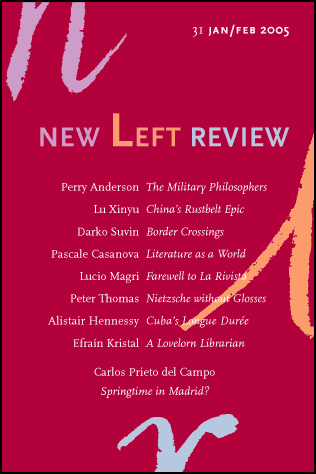In an era of serial war, Rawls, Habermas and Bobbio as theorists of a perpetual peace. Jurisprudence and force in three parallel philosophical constructions of the present international order, and the unsettled afterthoughts—American, German, Italian—that accompanied them.
How far has Spain travelled, and in what direction, since the most cobwebbed corner of the West became the export model of eu democracy? The legacy of a century and a half of reaction, social and national contradictions of the González–Aznar years, the dénouement of the 2004 election, and the first—so far mostly welcome—steps of the Zapatero government.
A manifesto for the accurate conjugation of the aesthetic and political, from the author of The World Republic of Letters. What is the nature of the global literary space in which writers must produce their work? The limits of analogies based on Braudel or Wallerstein, and fields as employed by Bourdieu. Hierarchy, inequality and strategies of reversal in ‘the long and merciless war of literature’.
The editor of Italy’s leading monthly of the Left explains, in a balance-sheet of the opening years of the century, why the journal is closing. As the Italian opposition gears up for resuming power next year, tactical manoeuvre replaces substantive debate, and ethical repentance disavows solidarity with political resistance. Electoralism and neo-Quakerism in the land of Garibaldi and Gramsci.
Has exile been overstated, by Edward Said and others, as a characteristic condition of the modern artist? Darko Suvin suggests a more fine-grained typology of displacement, distinguishing between exiles, émigrés, expatriates and refugees, and proposes the category of ‘border intellectuals’ as a better understanding of figures like Said himself. Reflections on the inner phenomenology of each condition, and the historical forces that have produced them.
West of the Tracks, Wang Bing’s stupendous documentary on the collapse of heavy industry and the fate of workers in China’s North-East, viewed in comparative perspective by a film-critic compatriot. Memories of the battlegrounds of Manchuria, and echoes of Lukács, Benjamin and Hobsbawm, amid the debris of an epoch and its human fall-out.
Peter Thomas on Domenico Losurdo, Nietzsche, il ribelle aristocratico and Jan Rehmann, Postmoderner Links-Nietzscheanismus. Two deconstructions of contemporary treatments of Nietzsche, restoring the virulence of his thought to its nineteenth-century contexts.
Alistair Hennessy on Richard Gott, Cuba: A New History. Town and country, race and immigration, revolution and isolation, in Spain’s pearl of the Antilles, from Columbus to the heirs of Castro.
Efraín Kristal on Edwin Williamson, Borges. A Life. The personal chagrins and political conversions of Argentina’s greatest writer, from youthful lyrics on the Red Guard to elderly pleasantries with Pinochet, and final recusances.
